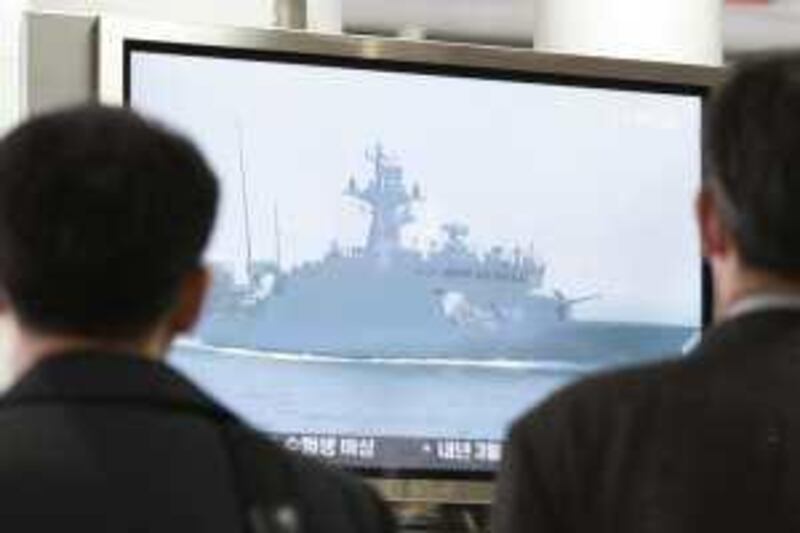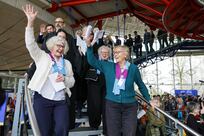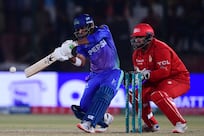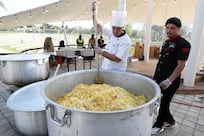BEIJING // A North Korean patrol ship and a South Korean naval vessel exchanged fire yesterday on the two countries' disputed western coast, leaving the retreating northern ship badly damaged and in flames, southern officials said. But analysts said the naval confrontation between the two Koreas, the first such clash in seven years, is not likely to escalate, with some even suggesting the North deliberately provoked the South in order to raise tensions and pressure the US to enter into bilateral talks.
The White House warned North Korea against any actions that could be seen as an "escalation". The clash broke out in the morning when a northern patrol boat crossed the Northern Limit Line (NLL) - the de facto sea borderline between the two Koreas since the 1950-53 Korean War - into southern territory, South Korean officials said. North Korea does not officially recognise the border. Southern military officials said warning alarms were sounded five times before their boat fired a warning shot, to which the northern boat responded with gunfire. The South's warship fired back, apparently striking the northern patrol boat, which fled. The South Korean boat was hit 15 times during the hour-long confrontation, Rear Adm Lee Ki-shik told reporters in Seoul. "It's a regrettable incident. We are sternly protesting to North Korea and urging it to prevent the recurrence of similar incidents."
According to South Korea's Yonhap news agency, the North fired 50 rounds in total and the South Korean boat fired back about 200 rounds, setting the northern boat ablaze. South Korea's prime minister, Chung Un-chan, said in a televised broadcast the North Korean boat had retreated "in flames". North Korea's military claimed in a statement that a group of southern warships opened fire but fled after the North's patrol boat dealt "a prompt retaliatory blow". It also said the South should apologise.
There were no casualties on the South Korean side while it was not immediately known whether there had been any northern casualties, South Korean media reports said. Two previous naval clashes in 1999 and 2002 left scores of casualties on both sides. Later yesterday, the South Korean president, Lee Myung-bak, convened an emergency national security meeting, yet called for "calm" in dealing with the situation.
Lee Dong-kwan, the chief presidential press officer, said in a release: "The president instructed the military to react decisively, yet calmly to make sure the situation does not further deteriorate." A South Korean government official, who spoke on condition of anonymity due to his protocol, said: "We're still assessing the situation to determine whether the North's provocation was accidental or premeditated."
State-controlled media in China, North Korea's chief ally and main economic benefactor, swiftly reported the incident that occurred off its east coast but did not give any official reaction. The Japanese media ran it as the major news of the day, linking the incident to the visit from Barack Obama, the US president, to Asia this week which will take him to Japan, China and South Korea. Some analysts say the North's intention is to put pressure on Mr Obama so that Washington will be more forthcoming in negotiating with Pyongyang. Other analysts said the clash was possibly a case of miscommunication.
"Let's take it easy," said Zhu Feng, a security analyst at Peking University in Beijing. "Judging from all the signs, I don't think it was intended. It was more like the restaging of the previous two accidental naval clashes in 1999 and 2002. I don't see it was premeditated." Most believe that neither of the Koreas has an interest in escalating the confrontation and certainly neither would push for a war.
Still, some see calculation in the North's decision to cross into southern territory. Cha Du-hyeogn, the director of North Korean studies at the state-run Korea Institute for Defence Analyses in Seoul, said there was reason to believe the incident was not accidental. "In the past, when the South Korean navy fired a warning shot, the North turned away and went back into its territory," Mr Cha said. "But this time, when the South fired the warning shot, the North directly fired back at the South's boat, which indicates that the North crossed the NLL with some instructions."
Mr Cha said that what appears to be an act of provocation was in fact aimed at the United States. "The North was sending a warning to the US to have bilateral talks," he said. In October, the US said it would be willing to sit down one-on-one with the North Koreans to resolve the long-running nuclear negotiations. But for weeks, until now, the Obama administration has put off making a public announcement on the talks.
Last week, North Korea said the US should hold direct talks soon, warning "otherwise we would go our [own] way". One day later, North Korea said it has successfully weaponised more plutonium to build atomic bombs. Others say the North's provocation was intended to test the resolve of South Korea, which, under the conservative president Myung-back, has pursued a tougher policy on the North. Following yesterday's clash many in the South were concerned for the safety of southern citizens currently in North Korea, including those working in the joint industrial and tourism projects. In December, North Korea shut down the border, making the South Korean workers virtual hostages before it was reopened again in March 2009.
"We don't see any unusual signs there yet," said Chun Hae-sung, a spokesman for South Korea's unification ministry. "But we are closely keeping eye on the evolving situation." foreign.desk@thenational.ae





